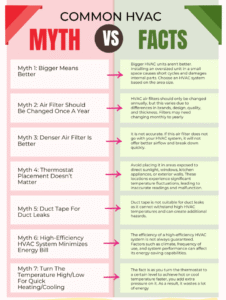Stop Believing These Misconceptions — Here’s What’s Actually True
When it comes to heating and cooling your home, HVAC myths can cost you money, comfort, and even system life. Many homeowners unknowingly follow outdated or incorrect advice, which leads to bigger problems over time. At Square HVAC, we believe in giving homeowners the right knowledge backed by real data, experience, and proven solutions.
In this article, we’ll break down 12 common HVAC myths and explain the real facts behind them.
12 Common HVAC Myths vs Data
Table of Contents
Toggle- Myth: Bigger HVAC Systems Are Always Better
✅ Fact: A unit that’s too large for your space will short-cycle (turn on and off constantly), wearing out internal parts and reducing system efficiency. At Square HVAC, we always recommend proper sizing for maximum comfort and energy savings. - Myth: You Only Need to Change the Air Filter Once a Year
✅ Fact: Depending on your system and filter type, you may need to replace it monthly or every 90 days. Our experts at Square HVAC suggest checking regularly for dust buildup. - Myth: Denser Air Filters Work Better
✅ Fact: If the dense filter doesn’t match your HVAC system, it can restrict airflow, cause breakdowns, and lower efficiency. Always use filters compatible with your system. - Myth: Thermostat Placement Doesn’t Matter
✅ Fact: Placement matters. At Square HVAC, we’ve seen thermostats near windows or heat sources give false readings. Install on an interior wall away from direct heat. - Myth: Duct Tape Is Made for Duct Leaks
✅ Fact: Despite its name, duct tape isn’t designed for HVAC ducts. It degrades under heat. Instead, use mastic sealant or foil-backed tape rated for HVAC systems. - Myth: High-Efficiency Systems Always Lower Energy Bills
✅ Fact: Efficiency only pays off if the system is properly installed, sized, and maintained. That’s why Square HVAC focuses on correct installation for long-term results. - Myth: If It’s Not Broken, Don’t Fix It
✅ Fact: Preventive maintenance is essential. Routine service from professionals like Square HVAC keeps systems running smoothly and prevents costly breakdowns. - Myth: Closing Vents in Unused Rooms Saves Money
✅ Fact: Closing vents disrupts airflow balance and forces your system to work harder. Instead, consider zoning systems for better efficiency. - Myth: Cranking the Thermostat Works Faster
✅ Fact: Your HVAC works at the same speed no matter the setting. Setting it drastically higher or lower only wastes energy. - Myth: Thermostats Are Always Accurate
✅ Fact: Accuracy depends on placement, maintenance, and sensor quality. If readings seem off, have Square HVAC recalibrate or upgrade your thermostat. - Myth: HVAC Maintenance Isn’t Necessary
✅ Fact: Skipping maintenance shortens system life and increases costs. Square HVAC offers regular inspections to keep your unit performing at its best. - Myth: A New HVAC System Always Boosts Home Value
✅ Fact: A new unit can increase value, but only if it’s from a recognized brand, installed correctly, and improves comfort. Otherwise, buyers may not notice.
HSPF4 vs HSPF5
✅ Understanding HSPF Ratings: HSPF measures how efficiently a heat pump converts electricity into heat. Higher = better.
✅ Efficiency Difference: HSPF5 units are more efficient than HSPF4.
✅ Cost vs Savings: Higher upfront costs often balance out with lower bills.
✅ Square HVAC Tip: If you’re looking for long-term savings and comfort, choose HSPF5 models for maximum efficiency.
Geothermal Heat Pump vs Gas Furnace
✅ How They Work: Geothermal uses underground temperatures, while gas furnaces burn fuel.
✅ Efficiency & Sustainability: Geothermal is eco-friendly and energy-efficient.
✅ Cost Considerations: Gas furnaces are cheaper upfront and great for cold climates.
✅ Square HVAC Recommendation: If you want sustainable, long-term savings, geothermal is a smart choice.
80 AFUE vs 96 AFUE
✅ AFUE Explained: Measures fuel-to-heat efficiency.
✅ 80 AFUE: 80% efficient, cheaper upfront but higher long-term costs.
✅ 96 AFUE: 96% efficient, reduces monthly bills.
✅ Square HVAC Insight: Though pricier, 96 AFUE models pay for themselves through energy savings.
4 Blinks on Furnace
✅ Diagnostic Codes: Four blinks usually mean airflow or ignition issues.
✅ Causes: Blocked vents, pressure switch failure, or airflow restriction.
✅ What to Check: Inspect filters and ductwork.
✅ When to Call: If issues persist, contact Square HVAC—our technicians can quickly diagnose and fix the problem.
Fan Coil vs Heat Pump
✅ Fan Coil Basics: Circulates air but depends on another system.
✅ Heat Pump Function: Provides both heating and cooling in one system.
✅ Usage: Fan coils are for large buildings; heat pumps are ideal for homes.
✅ Square HVAC Advice: If you want a standalone system, a heat pump is the better option.
🔑 Key Takeaways
- Bigger HVAC units aren’t always better—size matters.
- Change air filters regularly, not once a year.
- Don’t assume denser filters mean better results.
- Thermostat placement is crucial.
- Duct tape ≠ duct leak solution.
- High-efficiency needs proper installation.
- Maintenance is essential, not optional.
- Closing vents does more harm than good.
- Thermostat settings don’t change speed.
- Thermostats can be inaccurate.
- Preventive care avoids costly repairs.
- New systems don’t always equal higher resale value.
Final Thoughts
Your HVAC system is a major investment—don’t let myths lead to costly mistakes. At Square HVAC, we help homeowners make informed decisions, schedule regular maintenance, and get the most efficiency out of their systems.
Need help choosing the right HVAC system or troubleshooting an issue? Reach out to Square HVAC today and get expert guidance tailored to your home’s needs.



